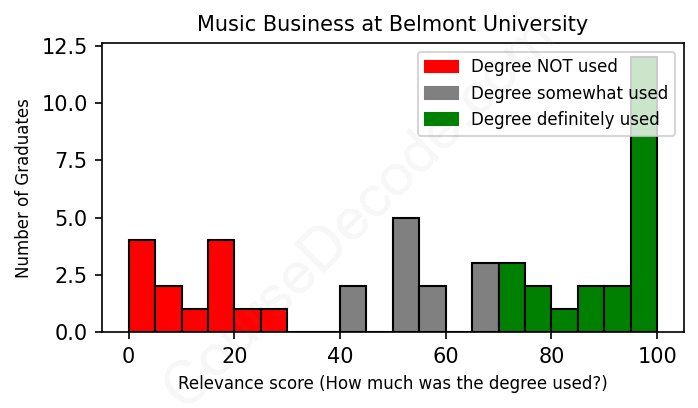
First, some facts. Of the Music Business graduates from Belmont University we've analyzed , here's how many have used (or NOT used) their degree in their career:

These are estimates based on AI analysis of 47 LinkedIn profiles (see below).
The verdict? Below average. Overall, with an average relevance score of 59%, Music Business graduates from Belmont University have a lower likelihood (-8%) of finding work in this field compared to the average graduate across all fields:
And for comparison, here's the chart for all profiles we've looked at across all degrees.
Also, after graduating, only 10% of these graduates have pursued further education other than another Bachelor's degree (such as a Masters degree or other), compared to the average across all profiles of 35%. This suggests a Bachelors degree is enough for most Music Business graduates, and it's normal to look for work straight after graduation.
See the details:
|
Relevance score: 41% We think this person has gone into a career only somewhat relevant to their degree. We think this person has gone into a career only somewhat relevant to their degree.
DEGREE INFOGraduated in 2021 from Belmont University with a Bachelor of Business Administration - BBA in Music Business. No other secondary education since. JOB HISTORY SINCE GRADUATIONResearch Analyst Progressive People Solutions Jan 2022 - Jun 2022 Virtual Administrative Assistant  Tango Apartment Finders Jan 2021 - Sep 2021 Real Estate Agent and Customer Relations Manager  Tango Apartment Finders Sep 2021 - Jul 2022 HR Coordinator | Talent Acquisition  CPS Energy Jul 2022 - Jan 2023 HR Coordinator | Strategic Talent and Executive Acquisition  CPS Energy Jan 2023 - Mar 2024 Human Resources Generalist  Innovatis Group Mar 2024 - Present ABOUTThru all of my work experience, my strength has always been PEOPLE. I currently work as an HR Generalist at Innovatis Group, leading recruitment, onboarding, and performance management, with particular attention on fostering a positive workplace culture and advocating for employee engagement and development. In short: Cultivating Happy Teams, One Strategy at a Time!Outside of the professional sphere, a large part of who I am is a singer/songwriter. I am an ASCAP (American Society of Composers, Authors, and Publishers) Writers Night Series Winner, International Songwriting Competition Semi-Finalist, 2019 Grammy U Songwriter Showcase Finalist, 2020 Grammy U Songwriter Showcase Winner, Belmont Best of the Best Showcase performer, Affinity Magazines Rising Singer to Watch, as well as the winner of the Fifth Annual BMI Foundation 2020 Nashville Songwriter Scholarship. Recently, I have also been named winner of Belmont University and Sony ATV's All Access Competition. My cuts include Black Coffee by Toronto-based bedroom pop artist AVIV which has amassed over 2 million streams and placed 9 Spotify Editorial Playlists such as New Music Friday and Fresh Finds: Indie. Other cuts include How Can You Smile by AVIV, Aiming for the Sun by Le Boeuf (over half a million streams), and So Good (On My Own) by Jordyn Taraez. Of more recent, I have been writing for JPOP artists and groups in partnership with ASCAP and FujiPacific in Japan.Some more fun facts about me: I enjoy fitness (specifically weightlifting) and anything health/wellness. My favorite food is by far Italian (yes, Sarro is Italian). Anything sport/adrenaline always interests meI taught myself how to snowboard on a solo trip to Colorado and am eagerly waiting to go back. I enjoy cooking but hate cleaning. Oh, and I love a good hike!So how 'bout it? Let's connect! |
The top 10 most common jobs done by the graduates we've analyzed (ranked most common to least) are:
After analyzing the career paths of Belmont University alumni with a degree in Music Business, it seems like there’s a pretty diverse range of jobs out there. A lot of graduates ended up in roles like Marketing Coordinators, Administrative Assistants, and various positions in the realm of artist management and music publishing, which makes sense since they directly tap into the skills learned in their degree. Jobs like those lean heavily on that music industry knowledge and business savvy, so you can see how they’re a good fit. For instance, being a Licensing Manager or working as an A&R Creative Director clearly shows a clear link to the music business and represents the kind of positions you’d expect someone with that degree to hold.
On the flip side, there’s a notable number of alumni who took jobs that are either tangentially related to the industry or completely off path. Positions like Security Officers, Administrative Supervisors, or even Sales Associates at retail stores don’t really require any special music knowledge. These jobs point to the idea that some graduates may have had difficulty finding work in their field or simply chose to explore different interests altogether. So, while you can find a solid chunk of Belmont grads thriving in music-related careers, there’s also a fair share that found their way into unrelated jobs, indicating that the connection to their Music Business studies can vary widely. Overall, it's a mixed bag, and while many are relevant to the industry, quite a few are not directly using what they learned at Belmont.
Here is a visual representation of the most common words in job titles for Music Business graduates (this is across all Music Business graduates we've analyzed, not just those who went to Belmont University):

When you look at the career paths of Belmont University graduates with a Music Business degree, there's a mix of outcomes, which can be pretty insightful. Right after graduation, many of them tend to start in internships or entry-level positions that are closely connected to the music industry, such as roles at record labels, entertainment companies, or music-based organizations. For instance, several graduates held internships with major names like Republic Records, Universal Music Group, and various artist management firms. This suggests that many are able to land relevant entry-level positions quickly, which is encouraging if you're passionate about a career in music.
Fast forward about five to ten years, and it seems like there’s a split in the trajectory of these graduates. Some have moved into solid roles within the music industry, like A&R representatives, marketing coordinators, or management positions. However, there are also quite a few who have headed off into unrelated fields or took jobs in sectors that don't directly utilize their music business skills, such as administrative roles or various positions in HR and logistics. This could imply that while the degree provides a solid foundation for a career in the music business, not every graduate manages to stay within the industry long-term. Overall, if you're considering a career in music, Belmont's program seems to open some doors, but staying in that vibrant scene seems to be a journey of its own!
Honestly, pursuing a Bachelor’s degree in Music Business at Belmont University, or anywhere really, can be a mixed bag. It’s definitely not a walk in the park—there’s a good amount of coursework that blends music theory, business principles, and industry know-how, which can feel challenging if you’re not prepared for that mix. But if you’re passionate about music and stay organized, you might find it a bit easier than other degrees, especially if you lean towards the creative side. Balancing projects, networking, and maybe some internships can be a lot to juggle, so be ready to put in the effort. Overall, it’s not the easiest degree out there, but if you love what you're studying, it can be a really rewarding experience!
Most commonly, in the LinkedIn profiles we've looked at, it takes people 4 years to finish a Bachelor degree in Music Business.
Looking at the career paths of these Belmont University graduates, it's a bit of a mixed bag when it comes to making decent money. A good number of them have made their way into solid roles within the music business and related fields like marketing, management, and legal stuff, which usually pay reasonably well—especially positions like licensing manager, trust officer, or in executive roles at music companies. However, there are also quite a few who’ve stuck with entry-level or part-time gigs, like bartending and internships, which definitely don’t pay as much. While some seem to be climbing the ladder into higher-paying positions or stable careers, others might still be figuring it out or taking jobs that don't quite reflect the investment in their education. So, in a nutshell, there's potential for decent earnings, but the journey really varies from person to person!
Here is a visual representation of the most common words seen in the "about" section of LinkedIn profiles who have a Bachelor degree in Music Business (this is across all Music Business graduates we've analyzed, not just those who went to Belmont University). This may or may not be useful:

Here are all colleges offering a Bachelor degree in Music Business (ordered by the average relevance score of their Music Business graduates, best to worst) where we have analyzed at least 10 of their graduates:
| College | Score | Count |
|---|---|---|
 New York University New York University
|
77 | 10 |
 Belmont University Belmont University
|
59 | 47 |
 Full Sail University Full Sail University
|
40 | 46 |